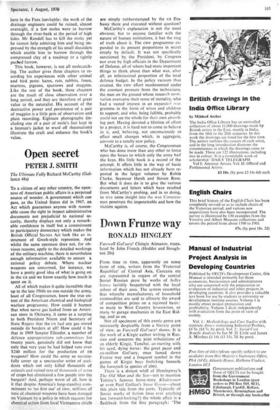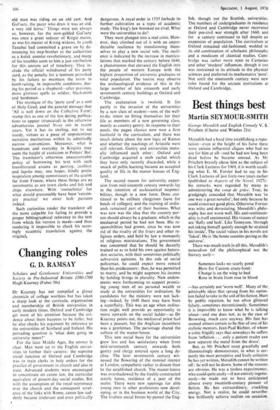Down Frunze way
RONALD HINGLEY
Farewell Gul'sary! Chingiz Aitmatov, trans, fated by John French (Hodder and Stough- ton 28s) From time to time, apparently on some form of rota, writers from the 'Fraternal Republics' of Central Asia, Caucasia etc are represented in organs of the central Soviet Russian press by works of belles Wires lavishly bespattered with the local colour of their area. The system resembles that whereby manufacturers of household commodities are said to allocate the award of competition prizes on a regional basis: so many to West Country housewives, so many to garage mechanics in the East Rid- ing, and so on.
Not all specimens of this exotic genre are necessarily despicable from a literary point of view, as Farewell Gul'sary! shows. It is the work of a Kirgiz author writing in Rus- sian and concerns the joint tribulations of an elderly Kirgiz, Tanabai, co-starring with his aged, dying horse: the great pacer and ex-stallion Gul'sary, once famed down Frunze way and a frequent symbol in the games of Kirgiz boys frolicking beneath the karagach (a species of elm).
There is a distant whiff of Hemingway's The Old Man and the Sea—not to mention Tolstoy's famous horse-story Kholstomer or even Paul Gallico's Snow Goose—about this plain tale from the yurts. Typically of Soviet works of fiction (was ever anything less forward-looking?) the whole affair is a flashback from the first paragraph: 'The
old man was riding on an old cart. And Gul'sary, the pacer who drew it was an old, a very old horse.' Things were not always so, however, for the now-gelded Gul'sary was once a great Seducer of Kirgiz mares, as was his master of Kirzig widows. In youth Tanabai had committed a grave sin by de- nouncing his step-brother to the authorities as a kulak counter-revolutionary, and many of his troubles seem to him a just retribution for this ancient act of treachery. They in- clude the official withdrawal of his party card, as the penalty for a tantrum provoked by his failure to maintain, the norm in lamb-raising, in impossible conditions, dur- ing his period as a shepherd—after previous, more glorious spells as soldier, blacksmith and herdsman.
The mystique of the `party card' as a sort of Holy Grail, and the general message that 'All is well down on the Collective Farm', stamp this as one of the less daring publica- tions to appear (truncated) in the otherwise adventurous journal Novy mir in recent years. Yet it has its sterling, not to say sturdy, virtues as a piece of unpretentious narrative meritorious within its admittedly narrow conventions. Moreover, what is humdrum and everyday in Kirgizia may seem the height of exoticism in Potters' Bar. The translator's otherwise unaccountable policy of bestrewing his text with such transliterated arcana as partorg, zavkhoz and lapsha may, one hopes, kindle poetic inspiration among connoisseurs of the quaint far from Frunze, where these things are as unromantic as are town clerks and fish and chips elsewhere. With `zootechnics' for what should presumably have been 'veterin- ary practice' we enter lush pastures indeed.
Such curiosities render the translator all the more culpable for failing to provide a proper bibliographical reference to the text from which his version is made—and thus rendering it impossible to check his seem- ingly eccentric translation against the originals































 Previous page
Previous page